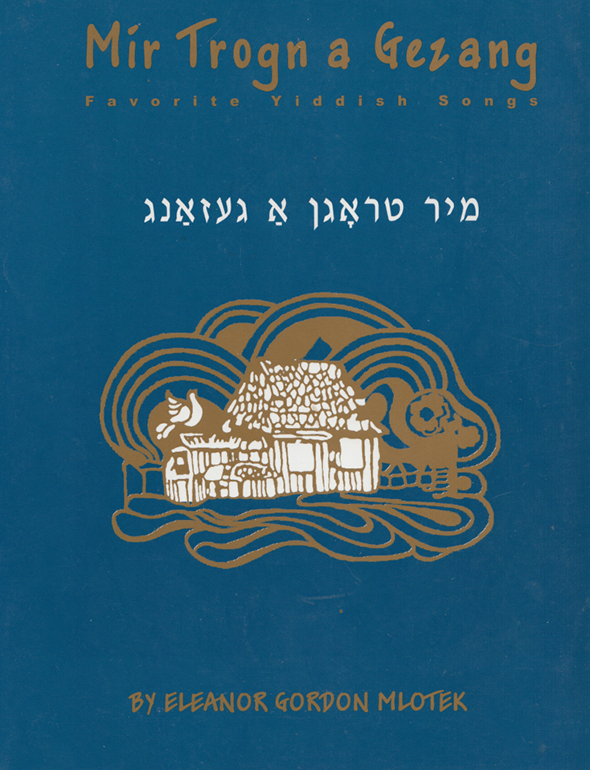Written during World War I, by Moshe Kulbak, Polish-Yiddish poet (1896-1940), one of the first Yiddish authors to “disappear” in Soviet Russia in the 1930’s, which marked the beginning of the planned liquidation of Yiddish writers and Yiddish cultural institutions. The poem was printed in 1916. The text and music were published in 1918 by M. Kipnis.

Little star, my blue herald, won’t you be a messenger to my village for me? There you’ll find my sad and worried wife. Comfort her and bring her light. You will see a little street and then a ditch- that’s where you’ll find my shack. Alone and forlorn at the dark window my wife sits sadly and worries. Comfort her, little star, and bring light into the house. Tell her the Lord will show mercy. Ask how are Yankele, Leytse and Rivele; tell them I read and kiss their note. Tell them not to spoil Yankele but to send him to Kheyder, for he has been spoiled enough. Let him learn to recite the Kaddish properly. Who knows. . . God will be merciful.
Shterndl, shterndl, bloyer shtafetele,
Zay mir a sheliekh un fal in mayn shtetele.
Zen vest a gesele, nokh dem a gribele,
Dortn gefint zikh mayn khoreve shtibele.
Elnt, aleyn bay der fintsterer shaybele,
Zitst dort fartroyert un dayget mayn vaybele.
Treyst ir, du shterndl, laykht ir in shtub arayn,
Zog ir der eybershter vet zikh merakhem zayn.
Freg vos makht Yankele, Leytse un Rivele;
Zog zey ikh leyen un kush zeyer brivele.
Zog zey, az Yankelen zol men nit zhaleven,
Gebn in kheyder, genug im tsu baleven.
Zol er zikh oyslernen kadish vi s’dart tsu zayn,
Efsher. . . men veyst nit. . . nor got vet merakhem zayn.
שטערנדל, שטערנדל, בלױער שטאַפֿעטעלע,
זײַ מיר אַ שליח און פֿאַל אין מײַן שטעטעלע.
זען װעסט אַ געסעלע, נאָך דעם א גריבעלע,
דאַרטן געפֿינט זיך מײַן חרובֿע שטיבעלע.
עלנט, אַלײן בײַ דער פֿינצטערער שײַבעלע,
זיצט דאָרט פֿאַרטרױערט און דאגהט מײַן װײַבעלע.
טרײסט איר, דו שטערנדל, לײַכט איר אין שטוב אַרײַן,
זאָג איר: דער אײבערשטער װעט זיך מרחם זײַן.
פֿרעג װאָס מאַכט יאנקעלע, לאהצע און ריװעלע;
זאָג זײ איך לײען און קוש זײער בריװעלע.
זאָג זײ אז יאנקעלען זאל מעך ניט זשאלעװען,
געבן אין חדר, גענוג אים צו באַלעװען.
זאָל ער זיך אױסלערנען קדיש װי ס’דאַרף צו זײַן,
אפֿשר. . . מען װײסט ניט. . . נאָר גאָט װעט מרחם זײַן .
Song Title: Shterndl

First published in 1972, Mir Trogn A Gezang: Favorite Yiddish Songs was reprinted six more times (in 1977, 1982, 1985, 1987, 1988, 2000) due to popular demand. The songs in this anthology represent a sampling of beloved folk and well-known Yiddish songs, many of which are scattered in various song collections; some appear in very rare and inaccessible collections; and some were never before published. Folk songs comprise about a third of this volume and were selected mainly on the basis of popularity and sometimes for their historic significance. Needless to say, they are only representative of the vast, rich treasure of Yiddish folk material. The selection was made not only on the basis of personal preference, but in the knowledge they are favorites of many who sing these songs. Most of the songs represent the repertoire that was sung at Yiddish summer camps, May 1st demonstrations and at social gatherings. Many songs were introduced to American Jewry by Jewish immigrants who came to the United States after World War II, for whom these songs had been favorites in Poland and other East European communities destroyed by the Nazis.